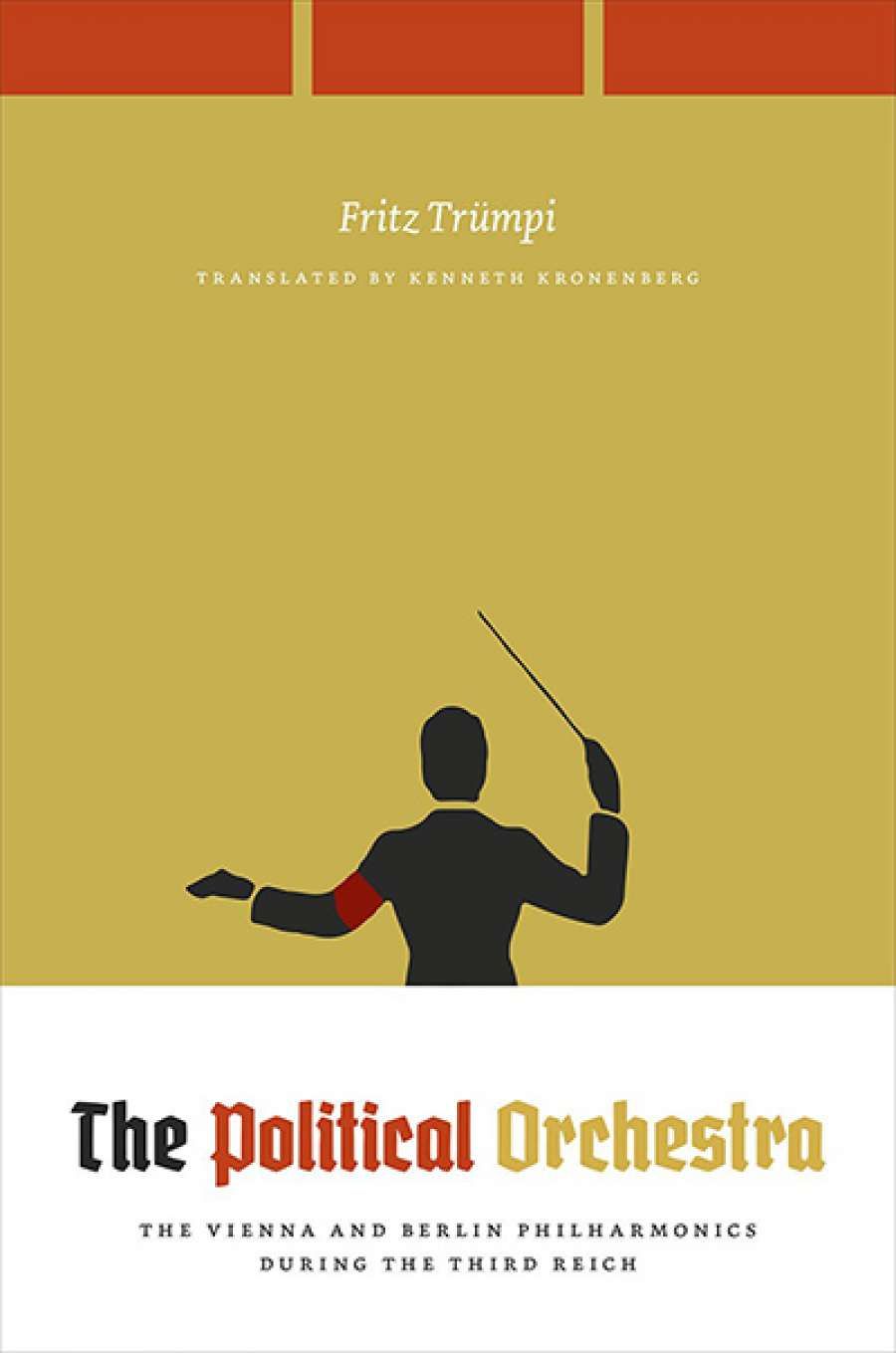
- Free Article: No
- Contents Category: Music
- Custom Article Title: Michael Morley reviews 'The Political Orchestra: the Vienna and Berlin Philharmonics during the Third Reich' by Fritz Trümpi, translated by Kenneth Kronenberg
- Review Article: Yes
- Online Only: No
- Book 1 Title: The Political Orchestra
- Book 1 Subtitle: The Vienna and Berlin Philharmonics during the Third Reich
This aim is clearly and succinctly articulated early in the book: ‘I will show how the histories of the Vienna and the Berlin Philharmonics are closely intertwined with the foreign-policy histories of Germany and Austria and how the ways in which the orchestras were instrumentalized were therefore politically determined from the outset.’ Along the way, the author then proceeds to tie this crucial question to such others as the politicisation of the orchestras and how ‘political exigencies and perspectives moulded their programs and concert practices and how ... these influenced the performance of music’. This may sound heavy on theory and socio-cultural-political discourse: in practice, the author has a fascinating and complex tale to tell, and does so brilliantly, combining a sure overview of historical data with a remarkable command of the often separate, often intersecting narrative strands.
Along the way, in six chapters, an elegant summary and conclusion, and, for the statistically minded, an appendix which examines the question of repertoire with the aid of a series of graphs and commentaries, Trümpi is as comfortable assessing the increased state influence on the orchestras during the years 1918–33 as he is considering the orchestras’ multifaceted media presence, or the burning issue of National Socialism and the Politics of Programming.
Whether he is considering the role of factory and work-break concerts (strangely enough, surprisingly few: the Berlin Philharmonic performed only five during the course of the war, while the Vienna Philharmonic performed none before 1943, and, until the end of the war, just twelve), or projects for fictionalised depictions of the orchestras, the author’s thorough research and ability to make these accounts live on the page make for lively reading. In the case of the latter, his presentation of the unrealised project ‘The Vienna Philharmonic in Outer Space; a Treatment for a Screenplay’ could, with few alterations, belong in an episode of Monty Python. Consider, for example, the following passage, drawn from the treatment submitted by a certain Professor Seibert (who also, at Furtwängler’s suggestion, was later granted an honorarium of 450 RM, resolved without discussion, ‘because of his advanced age’):
The treatment ... begins in Heaven, where Haydn, Mozart, Schubert, Beethoven, Brahms and Bruckner are having a conversation ... In the second scene the chairman of the association presides over a ‘director’s [sic] meeting’ in the Grosser Musikvereinssaal ... at which two outsiders are present: ‘A female: the fantasy sent from Heaven, and a male: an engineer specializing in stratospheric flight.’ Those present decide to undertake a ‘flight to Heaven in two massive airplanes’ whose propellers are giant treble clefs.
Demonstrating a nice line in understatement (after pointing out that the scenario closes with – what else? – a performance of Beethoven’s Ninth), the author notes: ‘this story line had completely slipped the bounds of reality and history’.
 1934 performance by the Kulturbund Deutscher Juden orchestra in the Berliner Philharmonie (photograph by Dr. Werner Liebenthal via Wikimedia Commons)
1934 performance by the Kulturbund Deutscher Juden orchestra in the Berliner Philharmonie (photograph by Dr. Werner Liebenthal via Wikimedia Commons)
Elsewhere, Trümpi offers story lines and characters which are all too closely linked to reality and history, and which, in the case of the examination of the history and role of the Vienna Philharmonic, result from the important fact that he is the first researcher to have access to the orchestra’s archive. Not that this was a straightforward exercise: his first applications (in 2003 and 2004) were denied, and it was only in 2008 that agreement was reached to allow ‘more or less unlimited access’.
Undoubtedly, this had to do with Austria and Vienna’s less than whole-hearted interest in revisiting its Nazi past – unlike Germany, which actually gave a name to such historical and cultural investigations: ‘Coming to Terms with the Past’. When one reads, in this study, that, during the Nazi years, among those awarded ‘The Ring of Honour of the Vienna Philharmonic’ were not just the conductor Clemens Krauss, but Gauleiter Baldur von Schirach; that others honoured included the Reichskommissar of the Netherlands, the Gauleiter of Carinthia and Salzburg, the mayor of Vienna, and the director of the German rail system; and that these distinctions were not revoked until 2013, it is an indication yet again of the thoroughness of Trümpi’s research and a reminder of Austria’s dilatory approach to acknowledging its history.


Comments powered by CComment